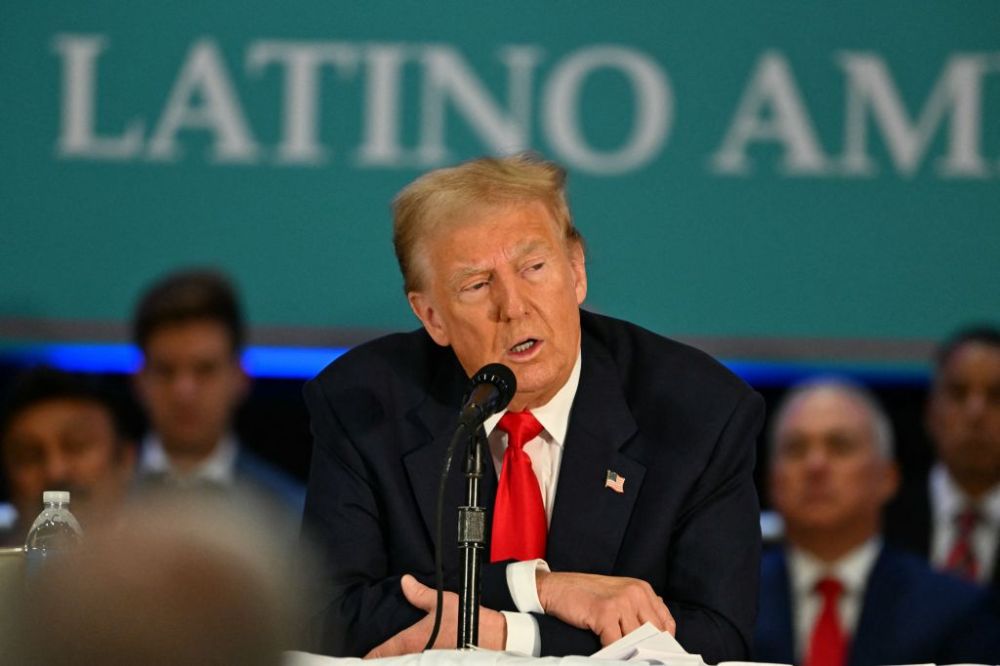Hey,
I really don’t have a lot of time to write this, but I’ve long had this idea that the first three or four days after a presidential election is a crucial moment for crafting conventional wisdom or narratives or whatever term we’re supposed to use. The raw election returns pour out in all of their molten, golden glory into a giant mold. Then the mob of pundits, pols, and activists rush in and try to smush their fingerprints on it as quickly as possible, to make their mark. As the metal cools, it becomes harder to make an impression on the gelling narrative. And once it fully hardens, the high priests hoist it up on rods and carry it around like a new golden idol we must all worship or, at least bow to, for the next four years.
So here’s my quick whack at the still malleable blob-god of conventional wisdom.
I think both the Harris and Trump campaigns had very different theories about the electorate. Both were right—but Trump’s was more right. A lot more right.
The gender gap stuff is real, though it’s more of a marriage gap, than a gender gap. Kamala Harris ran away with younger, single women. All things being equal, those are good voters to rely on, which is why 2022 went so well for Democrats. But presidential electorates are larger, and Donald Trump managed to turn out lower-propensity male voters in big numbers.
I think Harris definitely did better than Joe Biden would have. A lot of the chatter about how she “underperformed” Biden—and she did—sometimes makes it sound like 2024 Biden wouldn’t underperform 2020 Biden if he’d stayed on the ticket. I think that’s preposterous, even though I am sure Biden will say (or leak) as much sometime soon.
But Harris was a bad candidate given the fundamentals. (I promise just a little more rank conventional punditry before I get to my real point.)
Americans think the economy sucks, and while you can make an argument at the macro level that they’re wrong, people live at the micro level and they’re right about their own lives. A decline in the rate of increase in inflation doesn’t feel better. If the room is getting unbearably hot, being told the rate at which it is becoming even more intolerable is slowing down offers no comfort.
People are in an anti-incumbent mood across the West for a bunch of reasons—from inflation to hangovers from the pandemic and the financial crisis of 2007-08 to anger over illegal immigration. Indeed, I think illegal immigration coinciding with inflation is a particularly toxic mix.
Harris was running as an incumbent in an unpopular administration, and she couldn’t figure out how to say she’d do anything differently. That’s bonkers. Moreover, she is chronically incapable of speaking blue collar, never mind bubba. She often sounds like the head of HR at the Poetry Foundation interviewing for the top job. At a moment when the education divide is the bloody edge of the culture war, someone talking like a college president is not what the times demand.
I don’t want to sound like all of this was obvious. Nobody knew with any confidence how this election would play out until it did. Electorates are a little like Schrödinger’s cat: You don’t know if they’re a live proposition or a dead one until you open the box on election night. A lot of people in Trumpworld are immensely cocky right now with realignment and mandate talk.
There will be plenty of time to discuss all of this more, but that’s the way the winners always talk—for a while. Then they discover that the electorate that put them in office also put people from the other party in power. They get to claim a mandate, too. Moreover, having voted for a politician is not an oath of blind loyalty. Voters change their minds about who they voted for all the time. That’s why both parties keep getting thrown out of office.
All right, enough of that. I said on the Remnant this morning that I would write about something else, so I should follow through.
Choose the form of your destructor.
I don’t think I need to rehash all of the reasons I think Trump has no business being president again (or the first time). But that doesn’t mean I think that Trump’s reelection is all bad. I didn’t think his first presidency was all bad, either. That’s the thing about life: Good things have downsides, and bad things have upsides. People who think that all good things or all bad things go together are fundamentally utopian.
So, I want to focus on one upside and one downside of Trump’s victory.
Trump’s success with Latino voters last night is simply staggering. In 2016, Hillary Clinton won Starr County in Texas, by 60 points. It looks like Trump won it by about 16 points. That’s a 76-point swing in America’s most Hispanic county in eight years. Less dramatic but still impressive gains were on display across the country. He seems to have won Michigan Latinos by 19 points and tied with Harris among Latinos in North Carolina and Nevada. The exit poll numbers aren’t final and they may not be entirely accurate, but even if they’re directionally true it’s an historic swing led mostly by Hispanic men.
In other words, the gender gap trends that applied to white voters apply to Hispanics as well. This is good news all on its own because it means that Latinos are assimilating into American society. I like assimilation. Sue me. It’s also good news for Republicans for all the obvious reasons. Even if I have my issues with the GOP, the fact that the GOP coalition has more Hispanics in it than ever is probably a valuable check on some of the worst ideas percolating in MAGA world. But neither of these is the good news I have in mind.
Let’s talk about “the left” and “the right” as if they were more coherent and internally consistent things than they actually are. What do the left and right do? Sure, they push for government policies and all that but, at the really conceptual level, both the left and right are about trying to define how people think about not just politics and policy but culture and society broadly.
A key tool in this battle of conflicting visions, as I discussed last week, is what René Girard called “victimism.” Each side tries to define what group or class of people should be considered a righteous victim, deserving of special sympathy and attention, and who should be granted the authority to speak or fight for them.
For half a century now, the left has dominated the victimism battle. Over time, as the left won nearly all of the legal and most of the cultural fights over civil rights, gay rights, women’s rights, immigrant rights, etc.—which are all worthy concerns—the left became invested in identitarian arguments that tried to instantiate victim status as somehow innate, for certain groups. It became convinced that simply by virtue of being born into one of these categories you can make a special claim on peoples’ sympathies, government resources, whatever.
Whole industries and institutions grew up around the idea that “leaders,” “representatives,” or “allies” of these groups—in the media, academia, politics, wherever—had the right to decide what kind of language was offensive, outrageous, or disqualifying. Sometimes they were objectively right; sometimes they were idiots. We don’t need to revisit “Latinx,” but the idea that a handful of hyper-left-wing academic theorists and activists had the authority and legitimacy to impose their novel theories about de-gendering the Spanish language—in the name of inclusivity or anything else—was ludicrous.
One of the reasons a lot of people on the right love or simply support Trump is that he’s a human hand grenade against this stuff. He says things that should—and would—end the career of a normal politician. Mitt Romney got outrageously and unfairly dragged by the left for saying “binders full of women,” and it hurt him. Trump can brag about grabbing women by their privates and the professional offense-takers are powerless to destroy him. The fact that Trump won huge numbers of Hispanics and (white) women makes it hard for the self-appointed leaders of the non-whites or women to take offense on behalf of whole categories of people.
This makes me happy. I think identity politics is illiberal. A left-wing woman has no more authority to speak for all women than a right-wing woman. Women have agency and autonomy. Ditto blacks, Hispanics, gays, etc. Anything that weakens or breaks this illiberalism is progress as far as I am concerned.
But here’s the thing. The right has its own project and its own form of victimism (ex: traditional Christians, Joe the Plumber types). It seeks to define what should be considered offensive. It has its own ideas of who counts—or should count—as a victim in society. Unlike the left, it didn’t have to invent a whole new vocabulary for most of this stuff. Concepts like traditional values, good manners, notions of decent character were accessible to the right because conservatives don’t want to rewrite cultural norms. They see no reason to de-gender language or any of that junk. Of course, one price you pay for extolling old-fashioned ideas is that you can seem old-fashioned. But that never bothered me.
To simplify all of this, both the left and right are in the business of defining what constitutes acceptable manners. The problem with choosing Donald Trump as the perfect bull in the china shop for smashing the left’s project is that the bull doesn’t stay on the left side of the china shop. That whole effort to privilege old-fashioned decency, good character, etc.? “Trump smash!” Heck, Trump may talk a good game about Christians being victims, but in exchange he’s demanded a very long leash on abortion. Trump just got elected as a Republican president after making the GOP a de facto pro-choice party.
Most of the things that social conservatives said were central to their political and cultural agenda from the 1970s to around 2015 have been downgraded or abandoned in the Trump era. Or at the very least Trump has been exempted from them. Now you can argue it’s worth it. Some do. Hell, I do in some specific cases. I’ll take more shlong jokes from Donald Trump in exchange for forcing the Democrats to defenestrate the “defund the police” and “Latinx” crowd.
Again, everything is about trade-offs. Bad things have upsides and good things have downsides. But the only way to figure out if a trade-off is worth it is if you first acknowledge the trade-off exists. And such acknowledgments are in short supply these days.







Please note that we at The Dispatch hold ourselves, our work, and our commenters to a higher standard than other places on the internet. We welcome comments that foster genuine debate or discussion—including comments critical of us or our work—but responses that include ad hominem attacks on fellow Dispatch members or are intended to stoke fear and anger may be moderated.
With your membership, you only have the ability to comment on The Morning Dispatch articles. Consider upgrading to join the conversation everywhere.